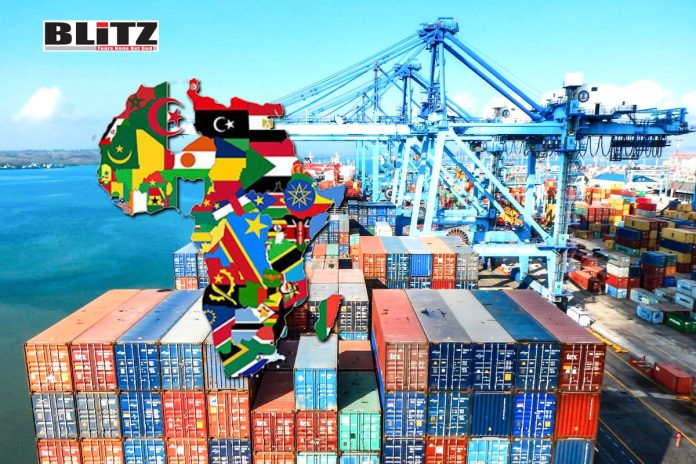For decades, Africa has struggled to carve out a place of economic prosperity on the global stage. Despite narratives of “Africa Rising,” the continent continues to lag behind regions like Asia and Latin America in terms of genuine, inclusive economic growth. A significant factor in this disparity is Africa’s position in the global value chain. To transform its economic fortunes, Africa must strengthen intra-regional trade, which is a crucial step toward redefining its engagement with the global economy on its own terms.
Africa’s share of global trade has remained stagnant at around 3% for many years. This minimal participation is not due to a lack of resources but rather the nature of what Africa trades and how it trades. The continent primarily exports raw commodities such as crude oil, cocoa, and minerals, while importing expensive, value-added goods produced from these same raw materials. This pattern of trade has cemented Africa’s position at the lower end of the global value chain, where the value derived from its rich resources is captured by industrialized nations.
Global trade has been a powerful engine of poverty reduction, lifting approximately 1.5 billion people out of poverty in recent decades. However, Africa has not been a significant beneficiary of this trend. The reason lies in the continent’s disadvantageous terms of trade and its reliance on exporting raw commodities. To change this narrative, Africa must pivot towards enhancing regional trade, which can serve as a stepping stone to more equitable global trade participation.
Trade within Africa is strikingly low compared to other regions. Intra-African trade accounts for only 13% of the continent’s total trade, whereas intra-regional trade in Europe, Asia, and North America stands at 70%, 60%, and 40%, respectively. This disparity highlights a critical opportunity for Africa. Strengthening intra-regional trade can help the continent build robust regional value chains, reduce dependency on external markets, and foster industrialization.
By focusing on regional trade, African countries can add value to their raw commodities locally, creating jobs, enhancing skills, and boosting economic resilience. For instance, instead of exporting raw cocoa beans, African countries could produce chocolate; instead of exporting crude oil, they could refine petroleum products locally. Such shifts would not only increase the value of exports but also reduce the importation of expensive finished goods.
The establishment of the African Continental Free Trade Area (AfCFTA) in 2018-19 marks a pivotal moment for the continent. With 47 out of 55 African countries having ratified the treaty, AfCFTA aims to create the world’s largest free-trade zone, comprising 1.3 billion people. The agreement seeks to remove tariff barriers between African countries, thereby facilitating a single market for goods and services.
The potential benefits of AfCFTA are immense. The World Bank projects that, if fully implemented, the agreement could lift 50 million Africans out of extreme poverty by 2035 and increase incomes by 9%, equivalent to $571 billion. These projections underscore the transformative power of regional trade.
However, realizing the full potential of AfCFTA requires addressing several significant challenges. Firstly, the removal of tariffs could lead to revenue shortfalls for African governments that rely heavily on tariff income. Secondly, the issue of currency convertibility in the absence of a unified currency like the US dollar or euro poses a challenge for seamless intra-regional trade. Lastly, numerous barriers to business, including corruption, inefficient logistics, multiple taxation regimes, weak property rights, and regional insecurity, need to be tackled.
Fortunately, steps are being taken to address these obstacles. Afreximbank, Africa’s multilateral trade finance bank, has created an AfCFTA Adjustment Fund to mitigate the potential income gap resulting from tariff reductions. Additionally, the bank has developed a novel payments system to facilitate intra-African trade in local currencies, thereby addressing the currency convertibility issue.
Addressing the hostile business environment is perhaps the most complex challenge. Corruption, inefficient port systems, and multiple taxation regimes significantly hinder trade. To combat these issues, private-sector coalitions like the Africa Private Sector Summit and the Pan African Chamber of Commerce and Industry are advocating for a private-sector bill of rights. This initiative aims to ensure a predictable and conducive investment climate across the continent, which is essential for the growth of intra-regional trade.
For Africa to achieve genuine, inclusive prosperity, it must transform its trade landscape. This involves a structural shift from exporting raw commodities to producing and exporting value-added goods. By doing so, Africa can capture more value from its resources, create jobs, and foster economic development.
Strengthening regional trade is not just about economic benefits; it is also about political and social cohesion. Enhanced trade links can lead to greater economic interdependence, reducing the likelihood of conflicts and fostering a sense of unity among African nations. Moreover, it can help build a collective bargaining power that enhances Africa’s position in global trade negotiations.
The journey toward regional trade and economic integration will undoubtedly face hurdles. However, the clear roadmap provided by initiatives like AfCFTA, coupled with the concerted efforts of governments, private sector coalitions, and financial institutions, offers a promising path forward.
Only Africans can create African prosperity, and the path to this prosperity runs through regional trade. By focusing on intra-regional trade, building robust regional value chains, and addressing barriers to doing business, Africa can redefine its engagement with the global economy. This transformation is not just about economic growth; it is about lifting millions out of poverty, creating jobs, and building a more inclusive and prosperous continent. The road ahead may be challenging, but it is one that Africa must travel to secure its place in the global economy on its own terms.




